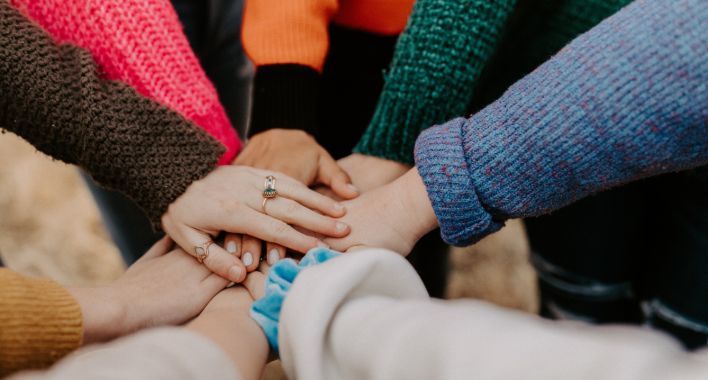The debate between cooperation and individualism, between the primacy of the interest of the group over the individual’s interest in managing life as a society, is as old as humanity itself.
When things are going well, that is, in what we call “situations of normalcy”, the tension between the group and the individual is usually resolved in a more or less civilized way. However, in situations of specific emergencies or prolonged crises the rope is tightened again. A typical example of an emergency would be a natural disaster, which occurs for a day or a few days but affects thousands of people. A sustained crisis would be, for example, a war or, as an example, a period of economic and health crisis such as the one caused by COVID-19.
We collaborate with others only if we find sufficient benefit or if we are forced toTherefore, the tension between respecting individual freedoms and interests and ensuring that these (whether legitimate or illegitimate) do not generate harm to others, that is, the bigger group, has been very present during the lockdown and also during the de-escalation: the asymmetrical period of phases that we started a few weeks ago with the expectation that, between the end of June and the beginning of July, we could lead a life quite similar to the one we had at the beginning of March. The so-called, not without controversy, “new normal”.

The famous phases basically consisted of a progressive and safe recovery of the usual activities that take place outside their homes: buying essential items and also those less necessary, travelling on public transport, walking, meeting again with their social surroundings, going back to work in their usual places instead of at home, going to shows and consuming in hotel and catering establishments, to give just a few examples.
Any individual human being could carry out these activities in any way and at any time without this posing a risk to himself, even in an emergency situation. However, it turns out that these activities have to be carried out in a shared manner with hundreds or thousands of people and that, in health emergency situations, is a source of tension that should be taken into account.
The tension is due to the fact that, in order to be able to carry them out, they cannot be carried out in just any way, but in very specific ways. Unfortunately, these ways entail a cost to the free satisfaction of individual needs.
Prosocial and antisocial
The rope tightens because we are willing to cooperate and sacrifice for a period of time and for certain reasons, but this ability is not eternal: either because we get tired, or because we do not get positive reinforcement powerful enough and fast enough (it is not always easy to see the concrete usefulness of our sacrifices), or because we deliberately decide to put our personal interests above the common good. Instead of cooperation, then selfishness prevails. Instead of support, sharing and waiting, voracity rules.
We would like to think that human beings are spontaneously cooperative and prosocial, that this kind of attitude comes to us by nature. The problem is that it is not so clear that we are like that. More often than we like to acknowledge, we collaborate with others only if we find sufficient benefit (or if we are forced to do so strongly enough). In this way, if this does not happen, we turn our eyes to our own navel, with the aim of surviving ourselves. This is the famous “every man for himself” in moments of crisis or the most punishing “and whoever comes after, let him go“.
In other words, the desire to cooperate, to wait or to sacrifice ourselves can arise so spontaneously, because we cannot deny that cooperating is tremendously useful and adaptive, as can the impulse to be selfish and to pursue our own satisfaction without measuring the consequences that this may have for others or for ourselves properly.
This is what would explain why these days, in different places in different countries, we are seeing behaviors that, with what we have learned about prevention during confinement, seem to us irresponsible and selfish, especially because they can end up generating great harm to the greater group (society as a whole).

As we move forward in the de-escalation phases, it is possible that certain conflicts that we would call “of coexistence” will increase and that are the fruit of personal selfishness, of the lack of containment when it comes to reincorporating ourselves into normal life and enjoying it. Also of how difficult it is, in general, to live a normality that is not normal at all but is full of precautions, preventions and rules whose effectiveness we can only verify in the long term and in which too many people trust too little.
The manifestations of anger
Among the collective actions that violate the health recommendations that we have incorporated in recent months are the famous demonstrations of people who are protesting because, according to those who participate, the government is cutting their freedoms unnecessarily.
This is a controversial and really unpleasant phenomenon at the social level, at the level of coexistence, because it mobilizes not only a discrepancy of opinions, but true and open aggressiveness, which is always dangerous. Aggressiveness is a spark that, once lit, can be extinguished by a sudden gust of wind or spread in an unexpected way.
In the case of demonstrations, at least those that take place in some places in Spain, it is crucial to distinguish what is really problematic from what is not, so as not to fall into a trap of false debates or misinterpretations. Being effectively analytical in the causes and effects of this phenomenon is fundamental not only to understand it but also to contain it. In other words: we must all put our brains to work in the face of these manifestations.
It is clear that the problem of the manifestations is not the intellectual disagreement with the way the authorities have to manage the health crisis. That disagreement can be better or worse argued, but it is unavoidable that there will be different opinions to those of the government and alternative points of view. Nor is the problem that such criticism is expressed. Although part of their argument is based on saying that it is, it is not: expressing disagreement has never been a problem. There can be debate about whether particular criticisms or certain ways of expressing them are more or less responsible or constructive, but they have always been allowed to be expressed: that freedom has never been suppressed.
The problem is that at a time like the current one, it is extremely irresponsible to organise demonstrations in which the recommended security distance is not respected and to do so when it is also a rule that we are all currently obliged to comply with. Disagreement with the government does not justify skipping the health recommendations designed to protect the whole population, not just each individual. Not to mention that in every democracy demonstrations are allowed but they must be done in an organized and authorized manner, since they imply the occupation of public space: that in which those who demonstrate and those who do not have to live together in an orderly fashion.
Spirit of contradiction
From a psychological point of view, anti-government demonstrations are, among other things, a very clear example of how contradictory we humans can be. We complain about being protected. We go into a crowd where it is impossible to keep a safe distance but we try to maintain the illusion that we are well separated. We question the dangerousness of the virus but we keep the mask on. To complain that the sanitary measures are unnecessary our fetish instrument (together with the poor pan or the frying pan) is a Spanish flag, etc.
The human being is a master when it comes to getting tangled up in clutter: in incredible troubles where opinions, behaviors and emotions can lead to the destruction of oneself and one’s peers while being convinced that it’s done for one’s own freedom.
On the other hand, the problem of these displays, being behaviors of evident risk for the collective health, is that they fracture enormously the principles of social cooperation that are always advisable but essential in a crisis like the one we are living. As these are aggressive transgressions of the health recommendations, these manifestations appear as an act of aggression that awakens the hostility of their spectators.
Those who do follow the rules, those who do sacrifice their individual needs provisionally for the good of others, those who choose to trust the leaders instead of contributing to the confusion and bad atmosphere, see with stupefaction, anger and uneasiness the behavior of their neighbors. Mainly because no one likes to sacrifice twice as much so that the one next to them doesn’t sacrifice anything, and because observing these demonstrations generates a great sense of indignation which, if not properly controlled, can multiply social aggressiveness and the final decision that we all give in to chaos, that is, individualism, and here it’s every man for himself (which is the polite version of “foolish the last”).
Extremes push us away
This social disagreement is, therefore, a consequence of having very polarized opinions on the same subject, that is, very different from each other. Also of the way of expressing them. As it is happening in Spain, it is very risky that a large part of the population perceives as unfair and unacceptable the behavior of another part of the population and, moreover, perceives that this way of acting harms everyone, also those who do not participate in it.
In other words, that they perceive the protest of others as something that is imposed on another, for example through a potluck that does not last 5 minutes, but 15, or by occupying the streets through which we all want to walk quietly with improvised but increasingly organized demonstrations.

The disagreement has to do with the lack of empathy of one sector of the population, that is, with their inability or refusal to perceive the needs and opinions of the other, but only their own and therefore not giving them any importance. Hence the authoritarian and imposing attitudes, so studied in social psychology, which are the opposite of assertiveness. Also from there the antisocial and even sociopathic conducts: those that are explicitly aggressive and harmful for oneself and others and also are carried out in a deliberate way because what prevails is the individual interest without caring about the consequences for others.
Dealing with selfishness
All this discomfort needs to be countered with certain personal qualities and also interpersonal skills so that living together does not turn into chaos.
We all want to sit quietly on a terrace without being afraid that the table next to us is too close, but distances mean that there are fewer tables on the terrace and it is therefore more difficult to get one.
We all want to shop relatively comfortably and quickly in the small shops in the neighbourhood but it turns out that we have to keep going one by one and that means that sometimes we have to queue up in the street and do it properly.
We all want to walk around at our leisure and at the time we want, but that can’t be right now and it is important to remember that this is not because you personally are not capable of doing things right, but because it is not possible for 47 million people to do things right all at once. That is why we need a more or less strict organization, with the inconveniences that this entails.
When we talk about interpersonal qualities and skills we are not talking about anything excessively new. We are talking about lifelong citizenship. It is not something that has been invented now just because it is essential in a situation like the present one. It is that in a scenario such as the present one it is more necessary than ever so that the economic and health crisis is not compounded by a crisis of coexistence whose results can be unpredictable.
Therefore, in order to avoid reaching that crisis of coexistence, we must promote the exercise of a series of virtues:
Patience
Understood as the ability to understand that my rhythms do not have to be the rhythms of the person in front of me, or those of my country. In other words, the capacity to wait without wearing myself out.
Prosocial attitude
Sympathy, kindness, courtesy, indulgence, generosity, organization, etc. are personal qualities that act as social glue, contribute to the non-fragmentation of relationships and even generate links and alliances where there are none.
Critical and analytical sense
Differentiate emotions from their expressions: for example, it is not the same to be indignant with someone’s performance (emotion) as to insult them (expressing emotion). Differentiate between legitimate and legal: for example, it is legitimate to want to protest against the government but it is not legal to organize any kind of demonstration. Differentiate the whole from its parts: agreeing with certain measures does not imply approving them all, just as criticizing one does not imply criticizing them all.
Active listening
Ranting, protesting, ranting is very easy and also strangely pleasant, because it activates us and loads us with reasons. It also gives us an goal in times of disorientation: I find a cause – in this case to fight what I disagree with – and addressing it gives me a purpose.

However, living together also means giving in, sharing and listening analytically to others, making an effort to understand the reason for their discontent (even if I believe they have no real reason for it) and differentiating the parts of what they express. Active listening means paying attention and remaining silent. While I am talking (or shouting) I am not listening.
Reinforce the common causes, not the opposite ones.
The number one common cause these days, whatever your ideology and situation is, is to return as soon as possible to the highest degree of the ” old normal ” as possible. We disagree on the methods that will lead to this, it is true, but as long as we remember that the goal is shared there will be a possibility for cooperation. And to cooperate we need to understand each other, just as to understand each other we need to listen to each other. Returning to normality through competition and confrontation can be an effective means, but it is doubtful that it will be efficient, because along the way too much could have been taken away. This applies equally to deciding whether I protest because I can’t get past the stage or whether I have to come to blows because my place on a terrace has been taken away.


